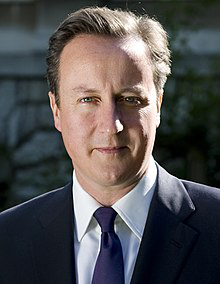

Prime Minister of the United Kingdom
David William Donald Cameron 9 October 1966 Marylebone, London, England
-
11 May 2010 – 13 July 2016
Prime Minister of the United Kingdom from 2010 to 2016 For other people named David Cameron, see David Cameron (disambiguation). This article is part of a series about David Cameron Political positions Electoral history The A-List MP for Witney Shadow Cabinet One-nation conservatism Prime Minister of the United Kingdom Premiership First Ministry and Term Cameron–Clegg coalition and agreement Bloody Sunday apology Spending, Strategic Defence, Balance of Competences reviews Military intervention in Libya (Operation Ellamy) Big Society Big Society Award National Citizen Service Alternative Vote referendum Phone hacking scandal 2011 riots Welfare Reform Act Health and Social Care Act London 2012 Summer Olympics Belfast City Hall flag protests Bloomberg speech Marriage (Same Sex Couples) Act 2013 Woolwich attack Scottish independence referendum Royal Mail privatisation Second Ministry and Term Second Cameron ministry Operation Shader Military intervention against ISIL in Iraq Piggate 2015–16 floods 2016 budget EU referendum Panama Papers Post–premiership For the Record Greensill scandal vte David William Donald Cameron (born 9 October 1966) is a British politician, businessman, lobbyist and author who served as Prime Minister of the United Kingdom from 2010 to 2016. He was Member of Parliament (MP) for Witney from 2001 to 2016 and leader of the Conservative Party from 2005 to 2016. He identifies as a one-nation conservative, and has been associated with both economically liberal and socially liberal policies. Born in London to an upper-middle class family, Cameron was educated at Heatherdown School, Eton College, and Brasenose College, Oxford. From 1988 to 1993 he worked at the Conservative Research Department, latterly assisting the Conservative Prime Minister John Major, before leaving politics to work for Carlton Communications in 1994. Becoming an MP in 2001, he served in the opposition shadow cabinet under Conservative leader Michael Howard, and succeeded Howard in 2005. Cameron sought to rebrand the Conservatives, embracing an increasingly socially liberal position. Following the 2010 general election, negotiations led to Cameron becoming prime minister as the head of a coalition government with the Liberal Democrats – the youngest holder of the office since the 1810s. His premiership was marked by the ongoing effects of the late-2000s financial crisis; these involved a large deficit in government finances that his government sought to reduce through austerity measures. His administration passed the Health and Social Care Act and the Welfare Reform Act, which introduced large-scale changes to healthcare and welfare. He also enforced stricter immigration policies, introduced reforms to education and oversaw the 2012 London Olympics. It privatised the Royal Mail and some other state assets, and legalised same-sex marriage in England and Wales. Internationally, Cameron's government intervened militarily in the First Libyan Civil War and authorised the bombing of the Islamic State of Iraq and the Levant. Domestically, his government oversaw the referendum on voting reform and Scottish independence referendum, both of which confirmed Cameron's favoured outcome. When the Conservatives secured an unexpected majority in the 2015 general election, he remained as prime minister, this time leading a Conservative-only government. To fulfil a manifesto pledge, he introduced a referendum on the UK's continuing membership of the EU. Cameron supported continued membership; following the success of the Leave vote, he resigned to make way for a new prime minister and was succeeded by Theresa May. Cameron has been the President of Alzheimer's Research UK since 2017. Cameron has been praised for modernising the Conservative Party and for decreasing the United Kingdom's national deficit. However, he has been criticised for his decision to hold the referendum on Britain's membership of the EU, which led to political instability in the UK during the late 2010s. He has also been accused of elitism and political opportunism. After leaving office he was implicated in the Greensill scandal after lobbying government ministers and civil servants on behalf of Greensill Capital.

We use cookies
We use cookies and other tracking technologies to improve your browsing experience on our website, to show you personalized content and targeted ads, to analyze our website traffic, and to understand where our visitors are coming from. Privacy Policy.